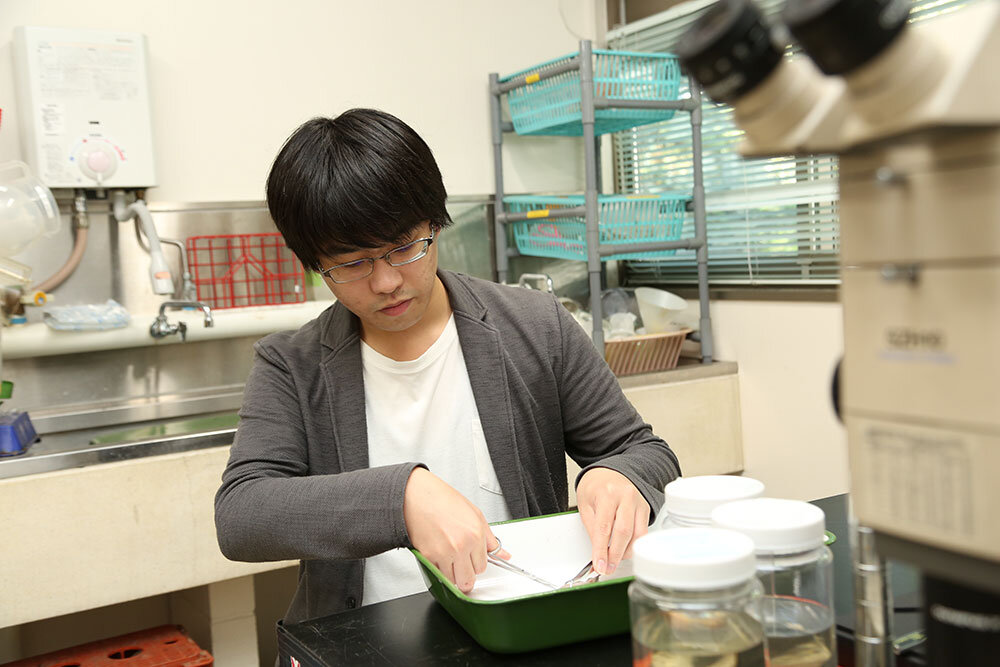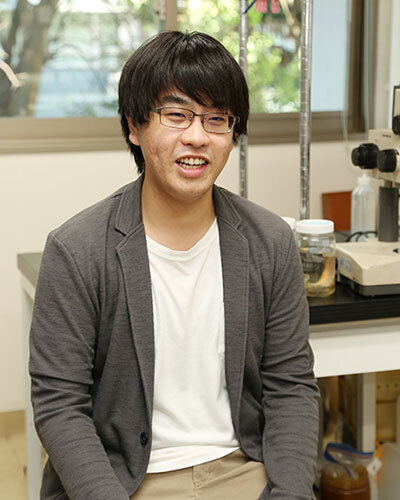INTRODUCTION学生紹介
- HOME
- support
- Student Introduction
- ETO AKIRA
STUDENT INTRODUCTION
Applied Marine Biosciences
ETO AKIRA
Specializations:Applied Biosciences
Main academic advisor:YOKOTA, Masashi
Mentor:MIYAMOTO, Ryusuke / KITAKADO, Toshihide

Turning My Passions and Interests into Research. Using AI to Lay a Foundation that Will Simplify Applied Research
Studying the feeding habits of deep-sea fish in terms of taxonomy and ecology allowed me to turn my passions and interests into research
I have always been interested in fish, particularly deep-sea fish, and so I enrolled at the Tokyo University of Marine Science and Technology to study them. To begin with, I found taxonomy to be very interesting. Then, while studying taxonomy at the same time as helping the museum organize its samples, I gradually began to take an interest in ecology as well.
When it came time to decide on my research topic, I initially wanted to look at the taxonomy of the deep-sea fish that inhabit Suruga Bay. However, during my research, I noticed that while quite a lot of research on taxonomy has been carried out in Suruga Bay, not a lot has been done on the ecology compared with other areas. Therefore, I thought it would be interesting to study the ecology of deep-sea fish in Suruga Bay, and now, at the graduate school, my focus is on the feeding habits of the deep-sea fish that inhabit Suruga Bay.
Investigating what deep-sea fish eat is ecology, but determining what creatures are in their stomachs is based on taxonomy. My research therefore combines the fun part of ecology with the fun part of taxonomy.
Wondering whether AI could be used to automate the time-consuming process of dietary surveys
Emptying the contents of a fish's stomach to figure out what it has been eating is not the same as studying a living fish or crab. Because things have been partially digested and have changed shape, there are many times when I am left scratching my head, unable to identify the stomach contents. Furthermore, the ability to identify creatures greatly varies depending on whether the species is in your sphere of expertise. For instance, if you are familiar with fish species, but do not really know shrimp, that causes a gap in your ability. Also, if the fish has eaten a lot, it can take 1 to 2 hours to examine the contents of its stomach. As one needs to investigate hundreds of fish to do meaningful research, this would take far too long. That is when I hit upon the idea of investigating the use of AI to automate these kinds of dietary surveys, and that became the subject of my WISE Program research.
Although my field is biological systems, I am interested in programming and AI, and taught myself about them as a hobby. The reason that I joined the WISE Program was so that I can learn about AI in a structured way. In the WISE Program, you get taught all the basics by professors who are experts in the fields of programming and AI, and you get plenty of opportunities to ask questions and receive support in the areas that are relevant to your research. Previously, I could only learn so much when I was self-studying, but now I am able to learn about the subjects more broadly. It is everything that I dreamed of.
Work that takes time now will have meaning in the future
 The university is in Shinagawa, and I travel there at a time that avoids the morning rush hour. Therefore, I usually arrive around noon every day, and work on my research until going home around 8 p.m. I am currently researching two things simultaneously: the feeding habits of deep-sea fish, which is work that I do at the graduate school, and looking at ways to automate it with AI in the WISE Program. The deep-sea fish that I use in my research are provided regularly by the fishers who fish in Suruga Bay and stored frozen at the university, so the first step in examining them is thawing them. At the same time as examining the stomach contents of the fish, I collect the data necessary to train the AI system by photographing the microscope image and annotating the food shown in the photograph. I plan to build an AI system that uses object detection technology to detect the food in the image, but it requires a great number of images to train the system, and gathering the images takes a lot of time. Therefore, automating the process is a long road, but, once it is done, it should cut the work time down to half what it is now. It is thus an important step to take for the future.
The university is in Shinagawa, and I travel there at a time that avoids the morning rush hour. Therefore, I usually arrive around noon every day, and work on my research until going home around 8 p.m. I am currently researching two things simultaneously: the feeding habits of deep-sea fish, which is work that I do at the graduate school, and looking at ways to automate it with AI in the WISE Program. The deep-sea fish that I use in my research are provided regularly by the fishers who fish in Suruga Bay and stored frozen at the university, so the first step in examining them is thawing them. At the same time as examining the stomach contents of the fish, I collect the data necessary to train the AI system by photographing the microscope image and annotating the food shown in the photograph. I plan to build an AI system that uses object detection technology to detect the food in the image, but it requires a great number of images to train the system, and gathering the images takes a lot of time. Therefore, automating the process is a long road, but, once it is done, it should cut the work time down to half what it is now. It is thus an important step to take for the future.
My research on AI will form a foundation that serves to make the process of carrying out applied research a lot smoother. Although I am currently studying feeding habits, I would eventually like to understand the whole ecosystem, and therefore also branch out into running simulations. I hope to be able to do this using my own data. There are various other things that I would like to research in the future.
Spending every day engrossed in the world of deep-sea fish, and conducting research with the inclusion of AI
The feeding habits of deep-sea fish are not well known. And so, during my examinations of the stomach contents of different fish, sometimes I am surprised not only by the kinds of things they ate, but also by learning that a certain fish is a carnivore, or discovering a creature I did not know existed. I get to experience the same thrill as a treasure hunter.
I have always been interested in deep-sea fish, but have rarely met anyone who shared my passion. However, when I entered university, I discovered there was a deep-sea fish club, and in the club room they had specimens that I had only ever seen in encyclopedias. Therefore, quite soon after entering university, I was able to see things that I was interested in but never thought I would have the chance to see in real life. Of course, the other people in the club are also interested in deep-sea fish. I was happy to be able to meet a large group of people who shared the same interest as me.
I will continue to study the things that interest me in a field that I enjoy, and also make use of AI, something that I was studying independently because I am interested in it, and am now receiving expert tuition on in the WISE Program. Every day is fulfilling, and I look forward to using my completed AI system to further my research in the future.

